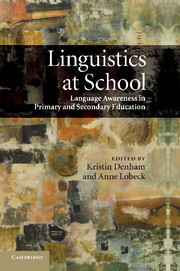Book contents
Foreword: The challenge for education
Published online by Cambridge University Press: 04 August 2010
Summary
A few years ago, my daughter received a Master's degree in Education from a prestigious and progressive program, and the school district in which she had interned hired her immediately to teach third grade. My pride in her notwithstanding, I was astonished to learn that her training had included nothing at all about the contemporary understanding of language: the structure of English, the systematicity of dialects, the cognitive challenges faced by beginning readers and English language learners, and the sociology of language prejudice – issues that from a linguist's point of view are central to all levels of K-12 education.
By virtue of having grown up with a linguist in the house, my daughter did indeed have some exposure to these issues. But typically, classroom teachers do not. The teaching of the structure of language as part of language arts was largely abandoned in the US twenty-five years ago, so many teachers do not even have a background from their own primary and secondary education, as they do in science and math. Rather, they are simply left to deal with language problems in their classrooms in terms of what they – and their administrators and their students' parents – take to be common sense.
As linguists constantly stress in their introductory courses, people's “common sense” about language is far from accurate. Moreover, it often stands in the way of effective education in speaking, understanding, reading, and writing mainstream English.
- Type
- Chapter
- Information
- Linguistics at SchoolLanguage Awareness in Primary and Secondary Education, pp. xiii - xviPublisher: Cambridge University PressPrint publication year: 2010
- 2
- Cited by



